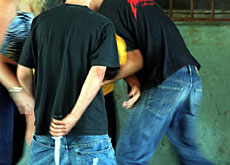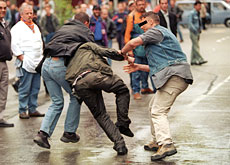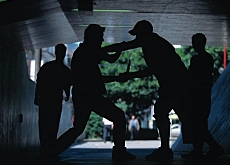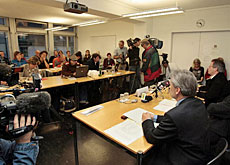Politicians “exaggerate” youth crime problem

Young people, especially foreigners, are being misused by politicians trying to score points in election year, a child psychologist tells swissinfo.
The issue of youth violence has been in the news since details of three alleged sexual assaults by youths on schoolchildren were revealed last year.
Recent crime figures also suggest that youth crime, particularly violent offences, is on the increase in Switzerland. Much of the blame has fallen on foreign youths, with the police chief of canton Zurich earlier this month calling for troublesome families to be deported.
The pressure group Swiss Time, backed by the rightwing Swiss People’s Party, presented a petition, with more than 30,000 signatures, to the federal authorities in Bern on Monday.
It calls for tougher custodial sentences for youth criminals, deportation, foreign parents to be held accountable for their children’s actions and compulsory citizenship tests before Swiss passports are granted.
But psychologist Allan Guggenbühl, a professor at Zurich University, thinks the problem is being exaggerated.
swissinfo: Are you concerned that youth crime is being used by politicians to score points?
Allan Guggenbühl: What worries me is that youths are being misused by the political debate. A lot of hot air is being produced to exaggerate the problem.
Suggestions are being made to introduce inappropriate harsh measures. There’s a real danger that these measures would escalate the problem by opening up a new battlefield that could increase the divide between youths and adults.
swissinfo: However, the latest crime statistics suggest a rise in youth offences. Does that worry you?
A.G.: These figures have to be read properly because the police are counting the events but not the culprits, so they might be misleading.
The tendency to report these crimes has risen a lot because people are more worried than before about violence amongst juveniles.
I’m not so sure that violence amongst youths has really increased, but a new type of brutality has appeared on the scene. It is not really on the increase but it is a new phenomenon.
swissinfo: What is behind this brutality?
A.G.: Young people in adolescence try to have a profile to make an impact on society. Nowadays one sees certain juveniles, who are not integrated into our society and have no goals or perspectives in their job or educational situation, choose violence to give themselves a profile.
swissinfo: Foreign youths are being blamed in particular for violence. Do you agree?
A.G.: We have a problem with a minority of foreign youths but it is not a national threat. The number of foreign juveniles that commit crime is high but this is understandable because they are not integrated and they come from countries that are problematic.
swissinfo: Is part of the problem a clash of cultures?
A.G.: We have juveniles from countries where it is more or less common to use violence, to fight someone who they think has insulted them. It is actually normal [for them] to use violence and get into a fistfight.
That used to be the case in Switzerland a hundred or two hundred years ago, but nowadays we have become a very restrained society. There we have a problem in that they have a different approach to physical fights.
But these fights are often not very serious incidents.
swissinfo: What does society have to do to tackle the problem of youth crime?
A.G.: We have to convey our core values to these juveniles about how we work out conflicts and can be critical of each other.
A lot of adolescents are confused and do not know how to deal with the other sex. We have to tell these adolescents what values they have to accept. The problem is that there are not enough people who confront them so they feel lost or left out.
swissinfo-interview: Matthew Allen
14,106 youths (11,189 boys and 2,917 girls) were convicted of crimes in 2005, according to the Federal Statistics Office. The figure is up about 2,000 on 1999.
62.7% of the convicted youths are of Swiss nationality.
The number of convictions for driving offences, attacks against people and property-related crimes has been on the increase since 1999, but there were fewer drug-related offences.
Three cases of alleged rape and sexual abuse committed by youths on schoolchildren in Zurich, canton St Gallen and Bern led to an outcry in Switzerland last year.
Allan Guggenbühl heads the department for group psychotherapy for children and youth at Bern’s Cantonal Education Counseling office, and the Institute for Conflict Management and Mythodrama (IKM) in Bern and Zurich.
He also lectures at the various Swiss colleges, and is the author of numerous books and articles.

In compliance with the JTI standards
More: SWI swissinfo.ch certified by the Journalism Trust Initiative




You can find an overview of ongoing debates with our journalists here. Please join us!
If you want to start a conversation about a topic raised in this article or want to report factual errors, email us at english@swissinfo.ch.